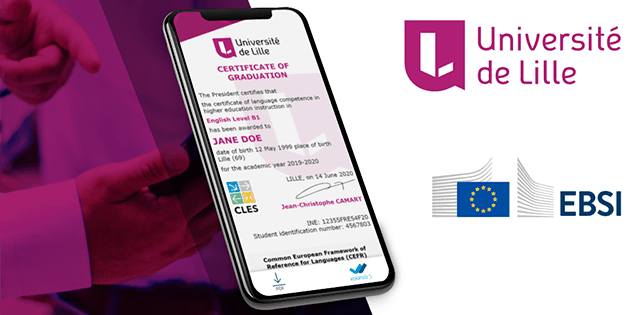The second day of the EBSI webinars of the University of Lille was dedicated to the use case: “Digital certificates and diplomas”. The Ministry of Education’s call for tenders for the creation of think tanks about the use of the blockchain for education has led to ambitious prospects for the modernization of student services.
Pierre Boulet, Vice-President of Digital Transformation at the University of Lille kicked off the event by presenting the European Blockchain Service Infrastructure (EBSI). EBSI’s objectives are straightforward: to support public services, comply with European regulations and enable the development of innovative services that improve mobility in the European Union. The main work focuses on the regulation of data sharing, the control of these data by citizens and the modernization of procedures. The 4 initial use cases of EBSI include diplomas, notarization, self-sovereign identity and secure data sharing.
A concrete example immediately followed when Luc Jarry-Lacombe, co-founder of BCdiploma, presented his company and his approach. Luc reminds us that the issue of digital credentials and open badges, certified certificates that are 100% digital, is urgent in many fields and applies directly to education, whether for certifications, diplomas or the recognition of skills. The BCdiploma solution, based on a patented blockchain technology, is simple and secure: employers can verify certified micro credentials by clicking on a link that the student can easily share. BCdiploma is available in production on Ethereum, Binance Smart Chain and soon on EBSI. Interoperability is one of the keys to the wider use of blockchain digital credentials.
The final presentation of the day was made by Benjamin Coste, digital project manager at emlyon business school. Benjamin is working, among other things, on the deployment of BCdiploma within the business school. Its main motivation is to fight against “diploma fraud”, the enhancement of the school’s brand image and the students’ digital experience. For a first job, students often need proof of graduation before the school can issue the “paper” version of diplomas. Efforts to implement a blockchain dematerialization solution began in 2019 with the completion of a pilot project. At the beginning of 2020, the entire class of 2019 received a diploma certificate on the blockchain: a pioneering achievement for a French business school. The goal of emlyon business school is to make them available to all alumni in the upcoming months. The biggest challenge of the project was that of evangelization around the technology of blockchain digital credentials, a complementary technology to the use of the traditional paper diploma.
A discussion on the results of the ARKeducation project closed this second webinar: the notions of governance and storage were discussed, but also the possible decentralized services around education.
The EBSI webinar series of the University of Lille was prepared and facilitated by Perrine de Coëtlogon, University of Lille, Board Member at Open Education Global, French representative at the European Blockchain Partnership – EBSI and Pierre Boulet, Vice President of Digital Transformation at the University of Lille.
The four webinars covered the following topics, selected by the European Blockchain Partnership:
- Self-Sovereign Identity and Blockchain Use case (Stéphane Mouy, identity and eIDAS expert); Daniël Du Seuil, European Blockchain Partnership – Belgium, SSI use case reporter; Roland Faure, Hyperledger identity working group);
- Digital certificates and diplomas (Luc Jarry-Lacombe, BCdiploma; Benjamin Coste, emlyon business school);
- Notarization, apostille & blockchain (Juliette Sénéchal, Senior Lecturer in Law, Blockchain & smart contracts research project, ULille; Spyros Pilos, Mirko Laconisi, European Court of Auditors; Brody Warren, Hague Conference);
- Secure data transfer (Hubert Marteau, Worldline; Frédéric Bellaiche, Dawex).
